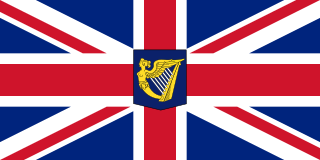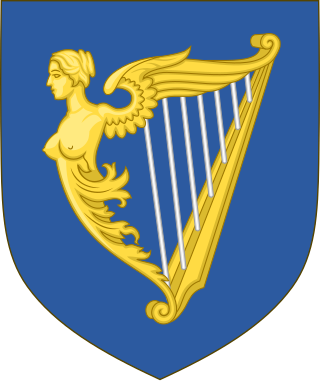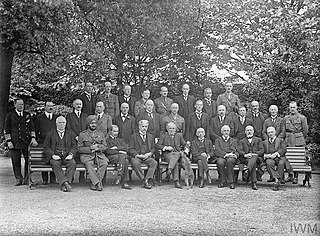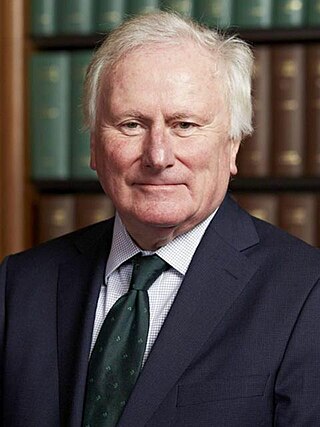
The Judicial Committee of the Privy Council (JCPC) is the highest court of appeal for the Crown Dependencies, the British Overseas Territories, some Commonwealth countries and a few institutions in the United Kingdom. Established on 14 August 1833 to hear appeals formerly heard by the King-in-Council, the Privy Council formerly acted as the court of last resort for the entire British Empire, other than for the United Kingdom itself.

The Privy Council (PC), officially His Majesty's Most Honourable Privy Council, is a formal body of advisers to the sovereign of the United Kingdom. Its membership mainly comprises senior politicians who are current or former members of either the House of Commons or the House of Lords.

The prime minister of Northern Ireland was the head of the Government of Northern Ireland between 1921 and 1972. No such office was provided for in the Government of Ireland Act 1920; however, the Lord Lieutenant of Ireland, as with governors-general in other Westminster Systems such as in Canada, chose to appoint someone to head the executive even though no such post existed in statute law. The office-holder assumed the title prime minister to draw parallels with the prime minister of the United Kingdom. On the advice of the new prime minister, the lord lieutenant then created the Department of the Prime Minister. The office of Prime Minister of Northern Ireland was suspended in 1972 and then abolished in 1973, along with the contemporary government, when direct rule of Northern Ireland was transferred to London.

Lord Lieutenant of Ireland, or more formally Lieutenant General and General Governor of Ireland, was the title of the chief governor of Ireland from the Williamite Wars of 1690 until the Partition of Ireland in 1922. This spanned the Kingdom of Ireland (1541–1800) and the United Kingdom of Great Britain and Ireland (1801–1922). The office, under its various names, was often more generally known as the Viceroy, and his wife was known as the vicereine. The government of Ireland in practice was usually in the hands of the Lord Deputy up to the 17th century, and later of the Chief Secretary for Ireland.

The Right Honourable is an honorific style traditionally applied to certain persons and collective bodies in the United Kingdom, the former British Empire and the Commonwealth of Nations. The term is predominantly used today as a style associated with the holding of certain senior public offices in the United Kingdom, Canada, New Zealand, and to a lesser extent, Australia.

The Chief Secretary for Ireland was a key political office in the British administration in Ireland. Nominally subordinate to the Lord Lieutenant, and officially the "Chief Secretary to the Lord Lieutenant", from the early 19th century until the end of British rule he was effectively the government minister with responsibility for governing Ireland, roughly equivalent to the role of a Secretary of State, such as the similar role of Secretary of State for Scotland. Usually it was the Chief Secretary, rather than the Lord Lieutenant, who sat in the British Cabinet. The Chief Secretary was ex officio President of the Local Government Board for Ireland from its creation in 1872.

The governor of Northern Ireland was the principal officer and representative in Northern Ireland of the British monarch. The office was established on 9 December 1922 and abolished on 18 July 1973.

Liberal David Lloyd George formed a coalition government in the United Kingdom in December 1916, and was appointed Prime Minister of the United Kingdom by King George V. It replaced the earlier wartime coalition under H. H. Asquith, which had been held responsible for losses during the Great War. Those Liberals who continued to support Asquith served as the Official Opposition. The government continued in power after the end of the war in 1918, though Lloyd George was increasingly reliant on the Conservatives for support. After several scandals including allegations of the sale of honours, the Conservatives withdrew their support after a meeting at the Carlton Club in 1922, and Bonar Law formed a government.
The Privy Council of Northern Ireland is a formal body of advisors to the sovereign and was a vehicle for the monarch's prerogative powers in Northern Ireland. It was modelled on the Privy Council of Ireland.
His or Her Majesty's Privy Council in Ireland, commonly called the Privy Council of Ireland, Irish Privy Council, or in earlier centuries the Irish Council, was the institution within the Dublin Castle administration which exercised formal executive power in conjunction with the chief governor of Ireland, who was viceroy of the British monarch. The council evolved in the Lordship of Ireland on the model of the Privy Council of England; as the English council advised the king in person, so the Irish council advised the viceroy, who in medieval times was a powerful Lord Deputy. In the early modern period the council gained more influence at the expense of the viceroy, but in the 18th century lost influence to the Parliament of Ireland. In the post-1800 United Kingdom of Great Britain and Ireland, the Irish Privy Council and viceroy Lord Lieutenant had formal and ceremonial power, while policy formulation rested with a Chief Secretary directly answerable to the British cabinet. The council comprised senior public servants, judges, and parliamentarians, and eminent men appointed for knowledge of public affairs or as a civic honour.
Robert William Hugh O'Neill, 1st Baron Rathcavan,, known as Sir Hugh O'Neill, 1st Baronet, from 1929 to 1953, was an Ulster Unionist member of both the Parliament of the United Kingdom and the Parliament of Northern Ireland.

The Privy Council of England, also known as HisMajesty's Most Honourable Privy Council, was a body of advisers to the sovereign of the Kingdom of England. Its members were often senior members of the House of Lords and the House of Commons, together with leading churchmen, judges, diplomats and military leaders.

Sir William Moore, 1st Baronet, PC (NI), DL was a Unionist member of the British House of Commons from Ireland and a Judge of Ireland, and subsequently of Northern Ireland. He was created a Baronet in 1932.

The Lords Justices were deputies who acted collectively in the absence of the chief governor of Ireland as head of the executive branch of the Dublin Castle administration. Lords Justices were sworn in at a meeting of the Privy Council of Ireland.

The Executive Committee or the Executive Committee for Northern Ireland was the government of Northern Ireland created under the Government of Ireland Act 1920. Generally known as either the Cabinet or the Government, the executive committee existed from 1922 to 1972. It exercised executive authority formally vested in the British monarch in relation to devolved matters.

Brian Francis Kerr, Baron Kerr of Tonaghmore, was a Northern Irish barrister and a senior judge who was Lord Chief Justice of Northern Ireland and then a Justice of the Supreme Court of the United Kingdom. At the time of his retirement, he was the longest serving Supreme Court Justice, and the last original member of the Court.
Sir John Joseph Sheil is a retired Northern Irish judge. He was a High Court Judge of Northern Ireland from 1989 to 2004, and a Lord Justice of Appeal of Northern Ireland from 2004 to 2007.












